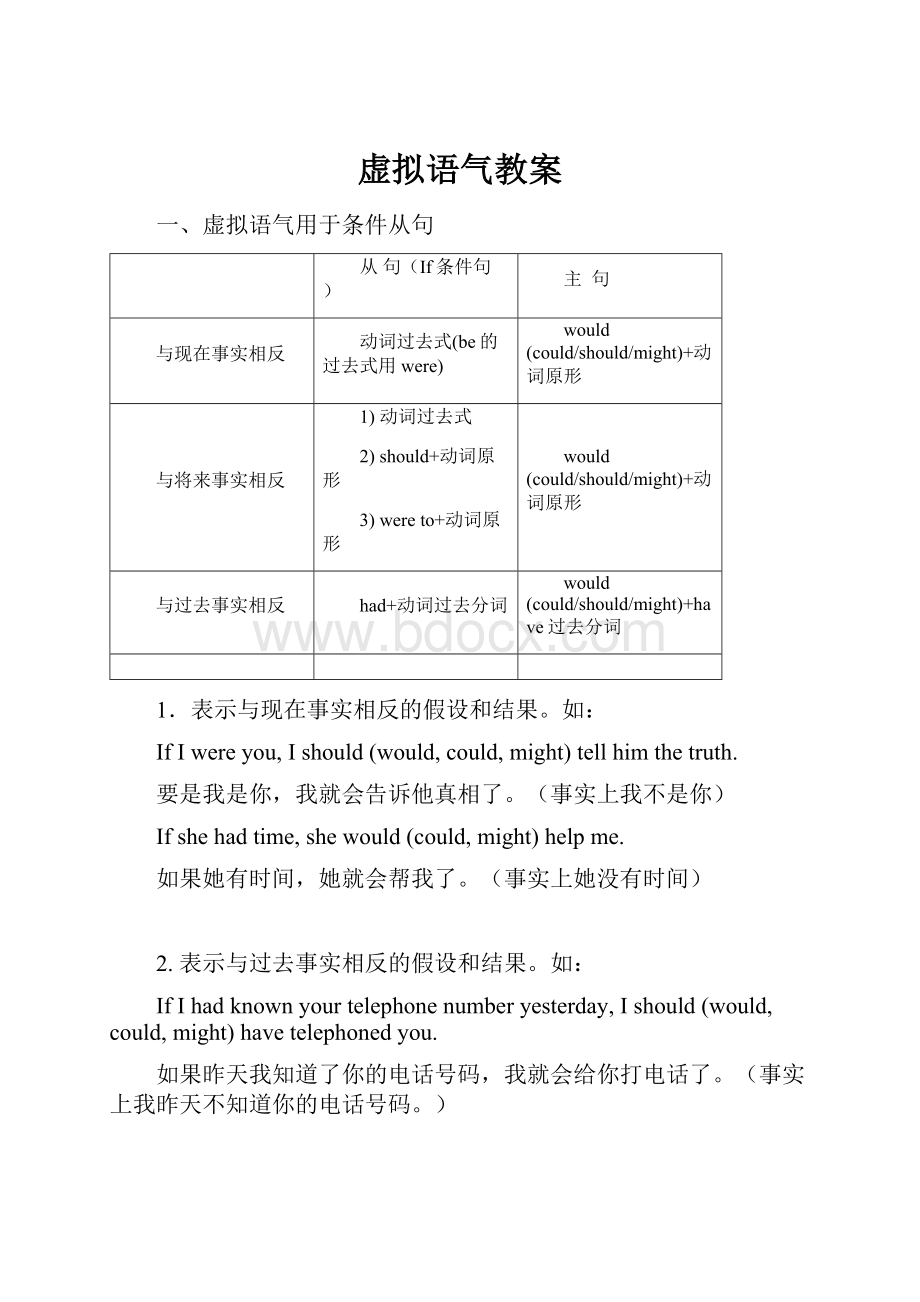虚拟语气教案.docx
《虚拟语气教案.docx》由会员分享,可在线阅读,更多相关《虚拟语气教案.docx(29页珍藏版)》请在冰豆网上搜索。

虚拟语气教案
一、虚拟语气用于条件从句
从句(If条件句)
主 句
与现在事实相反
动词过去式(be的过去式用were)
would(could/should/might)+动词原形
与将来事实相反
1) 动词过去式
2) should+动词原形
3) wereto+动词原形
would(could/should/might)+动词原形
与过去事实相反
had+动词过去分词
would(could/should/might)+have过去分词
1.表示与现在事实相反的假设和结果。
如:
IfIwereyou,Ishould(would,could,might)tellhimthe truth.
要是我是你,我就会告诉他真相了。
(事实上我不是你)
Ifshehadtime,shewould(could,might)helpme.
如果她有时间,她就会帮我了。
(事实上她没有时间)
2. 表示与过去事实相反的假设和结果。
如:
IfIhadknownyourtelephonenumberyesterday,Ishould(would,could,might)havetelephonedyou.
如果昨天我知道了你的电话号码,我就会给你打电话了。
(事实上我昨天不知道你的电话号码。
)
Ifyouhadtakenmyadvice,youwouldn’t(couldn’t)havefailedintheexam.如果你听了我的建议,你就不会考试不及格。
(事实上你根本没听我的。
)
3. 表示与将来事实可能相反的假设和结果。
如:
Ifitshouldrain,thecropswould(could,might)besaved.
假如天下雨,庄稼可能就收获了。
---WhatwouldhappenifIputthepaperonthefire?
---Itwouldburn.
---我若把只放在火上会怎么样?
---纸会烧着。
注:
在表示与将来事实可能相反的条件从句中,wereto+动词原形比较正式,常用于书面语中。
如:
IfyouweretogotoBeijing,youwould(could,might)haveachancetovisitTianAnMenSquare.
4.主从句时间不一致情况下的虚拟语气(混合条件句虚拟)
有时条件从句中的动作和结果与主句中的动作,发生的时间不一致,这时动作的形式应根据它所表示的时间加以调整。
如:
1) Ifyouhadfollowedmyadvice,youwouldbeabletofinishtheworknow.
如果你当时听了我的话,现在就能完成这份工作了。
(从句说明过去,主句说明现在。
)
2) IfIwereyou,Iwouldhavegonetoherbirthdayparty.
如果我是你,我就去参加她的生日晚会了。
(从句说明现在,主句说明过去。
)
3) Ifyouhadn’tlentmesomemoney,Icouldn’thaveboughtthenewhouseandmostlikelyIwouldbestilllivinginthedangeroushousenow.
假若你不借钱给我,我不可能买下这幢新房,很可能现在还住在危房里。
(从句说明过去,主句说明过去和现在。
)
5.条件从句中省去if的情况
在if引导的表示虚拟的条件状语从句中,常可以省略if,将had,were或should提至句首。
如:
a) HadIseenthefilm,Iwouldhavediscusseditwiththem lastnight.
假如我看了那部电影,昨晚我就可以和他们一起讨论了。
b) WereIabird,Icouldflyfreely.
假如我是一只小鸟,我就能自由翱翔。
c) Shoulditrainnextweekthefarmerswouldhaveagoodharvest.
要是下周能下雨的话,农民们就能有个好收成了。
6.含蓄条件句
非真实条件句中的条件从句有时不表出来,只暗含在上下文中,这种句子叫做含蓄条件句。
含蓄条件句大体有三种情况;
1).条件暗含在短语中。
如:
(1)WhatwouldIhavedonewithoutyou?
如没有你,我会怎么办呢?
(条件暗含在分词短语withoutyou中)
(2)Itwouldbeeasiertodoitthisway.这样做会比较容易。
(条件暗含在不定式短语todoitthisway中)
(3)Thissamething,happeninginwartime,wouldleadtoadisaster.同样的事,如发生在战时,就会酿成大祸。
(条件暗含在分词短语happeninginwartime中)
(4)Butforyourhelpwecouldn’thavesucceededintheexperiment.如果没有你的帮助,我们的实验是不会成功。
(暗含条件是butforyourhelp)
(5)Hemusthavethestrengthofahippopotamus,orhenevercouldhavevanquishedthatgreatbeast.他一定是力大如河马,否则他绝不会击败那只庞大的野兽。
(暗含条件是连词or)
(6)Alone,hewouldhavebeenterrified.如是单独一人,他是会感到害怕的。
(暗含条件是alone)
2).条件暗含在上下文中。
如:
(7)Youmightstayherforever.你可以永远待在这儿。
(可能暗含ifyouwantedto)
(8)Wewouldhavesucceeded.我们本来是会成功的。
(可能暗含ifwehadkepttrying)
(9)Yourreputationwouldberuined.你的名誉会败坏的。
(可能暗含ifyoushouldacceptit)
(10)Iwouldappreciatealittleofyourtime.谢谢你给我一点时间吧。
(可能暗含ifyouweresokindastogivemealittleofyourtime)
3).在不少情况下,虚拟式已变成习惯说法,很难找出其暗含的条件。
如:
(11)Youwouldn’tknow.你不会知道。
(12)Iwouldliketocome.我愿意来。
(13)Iwouldn’thavedreamedofit.这是我做梦也不会想到的。
(14)Hetoldthestoryinsuchminutedetailthathemighthimselfhavebeenaneye-witness.他将那事讲的非常仔细,简直就象他亲眼看见一样。
4).注意:
有时虚拟条件句并没来if从句表示出来,而是用介词短语(otherwise,or,without,butfor)、上下文或其它方式来表示。
⑴Wedidn’tknowhistelephonenumber;otherwisewewouldhavetelephonedhim.
⑵Withoutyouhelp,Iwouldn’thaveachievedsomuch.
⑶Butforyourhelp,Iwouldnothavesucceeded.
5).有时虚拟条件句的从句或主句都可以省略其中一个:
1.Icouldhelpyou.(只有主句)
2.IfIhadtime.(只有从句)
3.Sheshouldhavecometothemeeting.(只有主句)
4.Ifhehadmuchmoremoney.(只有从句)
7.其他形式的条件句中的虚拟语气
1)、用“without/butfor/intheabsenceof”表示“要不是”,“如果没有”(相当于ifitwerenotfor…)表示条件时,句中一般用虚拟语气。
(也可用陈述语气)
Withoutyourhelp,Icouldn’tfinishmyworkontime.
Intheabsenceofwaterandair,nothingcouldlive.
2)、由“providing(that)/provided(that)/onconditionthat/inorder
that”引导的条件从句或目的从句,根据情况,可用虚拟语气。
(有时也可用陈述语气)
Theyarewillingsurrenderprovidedtheyaregivenfreepassage.
3)、用without/butfor/intheabsenceof表示"要不是"、"如果没有",表示条件虚拟句:
(1).Withoutair,nothingcouldlive.要是没有空气,什么也不能生存。
(2).Butforyourassistance,wecouldnotaccomplishit.要不是你的帮忙,我们是难有成就的。
(3).Intheabsenceofwaterandair,nothingcouldlive.如果没有水和空气,什么也不能生存。
二、虚拟语气用于宾语从句
1、“wish+宾语从句”表示不能实现的愿望,汉语可译为“可惜…”,“…就好了”,“悔不该…”,“但愿…”等。
表示现在不能实现的愿望,从句的谓语动词用“would(could)+动词原形”表示过去不能实现的愿望时用“had+过去分词”或“(could)would+have+过去分词”。
例如:
Iwishitwerespringalltheyearround.
Iwishyoucouldgowithus.
Wewishwehadarrivedtheretwohoursearlier.
2、虚拟语气在动词arrange,command,demand,desire,insist,order,propose,request,require,suggest,decree,decide,object,pray,prefer,recommend,urge,vote,ask等后面的宾语从句中用“(should)+动词原形”。
例如:
Wesuggestedthatwe(should)haveameeting.
Weinsistedthatthey(should)gowithus.
Thedoctororderedthatshe(should)stayinbedforafewdays.
注意:
insisted作“力言”、“强调”解时,宾语从句不用虚拟语气。
只有当insist作“坚持(认为),”“坚持(应该)”解时宾语从句才用虚拟语气。
例如:
Mikeinsistedthathehadneverstolenanything.
3.wouldrather,wouldsooner,hadrather,would(just)assoon,wouldprefer之后的宾语从句中的虚拟语气
wouldrather,wouldsooner,hadrather,would(just)assoon,wouldprefer(希望)也用来表达主观愿望,它们之后的宾语从句中需用虚拟语气。
谓语动词用过去式表示现在或将来,用过去完成式表示与过去事实相反。
表示”宁愿做什么”或"对过去做的事的懊悔"。
(1).Iwouldratherhecametomorrowthantoday.
(2).Johnwouldratherthatshehadnotgonetothepartyyesterdayevening.
(3).Don’tliveintheworld,Iwouldrather(Iwouldjustassoon)youdie.
(4).Iwouldratheryougotomorrow.
(5).Iwouldrathereverythinghadn’thappenedinthepast.
(6).Themanagerwouldratherhisdaughterdidnotworkinthesameoffice.经理宁愿她女儿不与他在同一间办公室工作。
(7).Tobefrank,I’dratheryouwerenotinvolvedinthecase.坦率地说,我希望你不要卷入这件事。
(8).Youdon’thavetobeinsuchahurry.Iwouldratheryouwentonbusinessfirst.你没有必要这么着急,我宁愿你先去上班。
(9).I’dratheryoudidn’tmakeanycommentontheissueforthetimebeing.我倒希望你暂时先不要就此事发表意见。
(10).Franklyspeaking,I’dratheryoudidn’tdoanythingaboutitforthetimebeing.坦白地说,我宁愿你现在对此事什么也不要做。
(11).Wouldn’tyouratheryourchildwenttobedearly?
为什么你不愿让你的孩子早点上床呢?
(12).Iwouldjustassoonyouhadreturnedthebookyesterday.我真希望你昨天把这本书还了。
注:
①若某人愿自己做某事,wouldrather后用动词原形
Iwouldratherstayathometoday.
②wouldrather...than...中用动词原形
Iwouldratherstayathomethangoouttoday.
4.“hadhoped”后的宾语从句中的虚拟语气
用“hadhoped”表示原来希望做到而实际上未能实现的事情,其宾语从句的谓语用“would+动词原形”。
IhadhopedthatshewouldgototheU.S.andstudythere,butshesaidshelikedtostayinChina.我原本希望她到美国去念书,但她说她喜欢留在中国。
三、虚拟语气用于表语从句、同位语从句
advice,command,decision,demand,desire,idea,instruction,insistence,motion,necessity,order,plan,policy,pray,preference,propose,recommendation,regulation,request,requirement,resolution,rule,suggestion
四、虚拟语气用于主语从句
1、某些动词的过去分词:
advised,arranged,commanded,decided,demanded,desired,insisted,proposed,recommended,requested,required,suggested,urged等
2、由上述动词派生的形容词:
advisable,desirable,insistent,preferable,urgent等
3、其他一类表示建议、要求、意志、情感的形容词:
appropriate,best,better,compulsory,crucial,essential,good,imperative,important,keen,necessary,obligatory,possible,probable,proper,strange,vital等
4、Itisapity/shame/nowonder/one’swish+that从名结构中。
五、特殊用法
1、在倒装的让步从句中,通常只用be型,动词置于句首。
如:
Beiteversohomely,homeishome.
Beitrainyorsunny,Iwillgoout.
△在“开放式条件句”(openconditionalclause)和让步状语从句中should是被省略了的。
在这种情况下,如果if省略,动词be与主语的位置要倒装。
如:
⑴、Ifanypersonbeguiltyofacrime,thecourtshallhavetherighttoappeal.(任何人犯罪,法院有权起诉。
)
Beanypersonguiltyofacrime,thecourtshallhavetherighttoappeal.
⑵、Whethersheberightorwrong,shewillhavemyunansweringsupport.(不管她是对还是错,我都会支持她的。
)
Besherightorwrong,shewillhavemyunansweringsupport.
⑶、____,Iwilltakeherasmywife.
[A]Weresherichorpoor
[B]Beingrichorpoor
[C]Beshepoororrich
[D]Whetherisshepoororrich
2.虚拟语气在asif/asthough引导的方式状语从句中的应用
虚拟语气在asif/asthough引导的方式状语从句中,谓语动词形式与wish后的宾语从句基本相同
1.表示与现在事实相反或对现在情况有怀疑,谓语动词用过去式。
例如:
(1).Hefeltasifhealonewereresponsibleforwhathadhappened.他感到仿佛唯独他要对发生的一切负责。
(2).Heactsasifhewere/wasaTVexpert.他做起事来好象是个电视专家。
(3).AlantalkedaboutRomeasifhewereaRoman.艾伦谈起罗马来好像他是个罗马人一样。
(4).Johnpretendsasifhedidn’tknowthethingatall,butinfactheknowsitverywell.(用过去式表示与现在事实相反的假设)
(5).Hepretendsasifhedidn’tknowthethingatall,butinfactheknowsitverywell.(用过去式表示与现在事实相反的假设)他假装好象完全不懂那事,其实他对那事非常了解。
2.表示过去想象中的动作或情况,谓语动词用过去完成式。
如:
(1).Thetreelookedasifit______foralongtime.
A.hasn’twatered B.didn’twater
C.hadn’tbeewatered D.wasn’twatered
那棵树看上去好象很久没人给浇水了。
(答案是c)
(2).Theoldmanlookedatthepicture,hefeltasthoughhehadgonebacktotime20yearsago.(用过去完成式表示与过去相反的事实)
(3).Theoldmanlookedatthepicture,hefeltasthoughhehadgonebacktotime20yearsago.(用过去完成式表示与过去相反的事实)那老人看着照片,他觉得仿佛回到20年前的时光。
3.表示与将来事实相反:
(1).Theytalkedandtalkedasiftheywouldnevermeetagain(would+动词原形,表示与将来事实相反)
(2).Theytalkedandtalkedasiftheywouldnevermeetagain.(would+原形动词meet,表示与将来事实相反)他们谈了又谈,仿佛他们不会再相见的样子。
注:
在asif/asthough句中,如果有可能成为事实,用陈述语气.
Helooksasifheisgoingtobeill.
第二节:
虚拟语气用在lest,forfearthat及incase引导的目的状语从句中
在由lest等引导的目的状语从句中需用虚拟语气,表示“以防,以免”等意思,其谓语动词多由should+动词原形构成,should也可省略。
例如:
⑴、Hewaspunishedlestheshouldmakethesamemistakeagain.他被处以惩罚以免他再犯。
⑵、Themadmanwasputinthesoft-paddedcelllesthe_____himself.
a.injure b.injured c.hadinjure d.wouldinjure
这个疯子被关进墙上装有衬垫的病房,以免伤了他自己。
(答案是a)
3.介词短语表示虚拟
有时假设的情况并不以条件从句表示出来,而是通过一个介词短语来表示,或通过上下文或其他方式表示出来。
如butfor,butthat…,incaseof,otherwise,supposing,undermorefavourablecondition,without等表示让步假设。
1).Heworkedveryhard;otherwisehemighthavefailed.